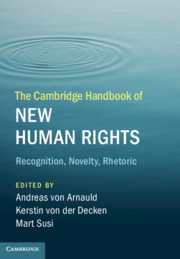Book contents
- The Cambridge Handbook of New Human Rights
- The Cambridge Handbook of New Human Rights
- Copyright page
- Contents
- Figures
- Contributors
- Acknowledgements
- Introduction
- Part I Cross-Cutting Observations
- 1 Recognition of New Human Rights
- 2 Novelty in New Human Rights
- 3 Rhetoric of Rights
- Part II Public Good Rights
- Part III Status Rights
- Part IV New Technology Rights
- Part V Autonomy and Integrity Rights
- Part VI Governance Rights
- Index
3 - Rhetoric of Rights
A Topical Perspective on the Functions of Claiming a ‘Human Right to …’
from Part I - Cross-Cutting Observations
Published online by Cambridge University Press: 04 January 2020
- The Cambridge Handbook of New Human Rights
- The Cambridge Handbook of New Human Rights
- Copyright page
- Contents
- Figures
- Contributors
- Acknowledgements
- Introduction
- Part I Cross-Cutting Observations
- 1 Recognition of New Human Rights
- 2 Novelty in New Human Rights
- 3 Rhetoric of Rights
- Part II Public Good Rights
- Part III Status Rights
- Part IV New Technology Rights
- Part V Autonomy and Integrity Rights
- Part VI Governance Rights
- Index
Summary
Within the last twenty or so years we have witnessed the introduction of a sizeable number of ‘new’ human rights into international law – and many more claims to ‘new’ human rights have been made. So many, indeed, that the danger of ‘human rights inflation’ has become a spectre that has haunted the debate for quite some time now. In his seminal article of 1984, Philip Alston had already attempted to prevent such inflation by calling for ‘quality control’, with the United Nations General Assembly as the institutional gatekeeper. Yet in practice the flood has not been tamed. Apart from the rights covered in this volume, a broad range of ‘human rights to …’ have been proposed even over the course of only the last few years: a human right to a green future, rights to remain natural, to be inefficient or to disconnect – or, conversely, a right not to be left alone – and a human right to exist without a physical or psychological threat from above, to name but a few. A recent publication even argued for a ‘right to be loved’. Looking at these examples, there seems to be something inherently appealing in calling for a ‘human right to …’, or even stipulating its existence de lege lata.
- Type
- Chapter
- Information
- The Cambridge Handbook of New Human RightsRecognition, Novelty, Rhetoric, pp. 34 - 50Publisher: Cambridge University PressPrint publication year: 2020
- 4
- Cited by



